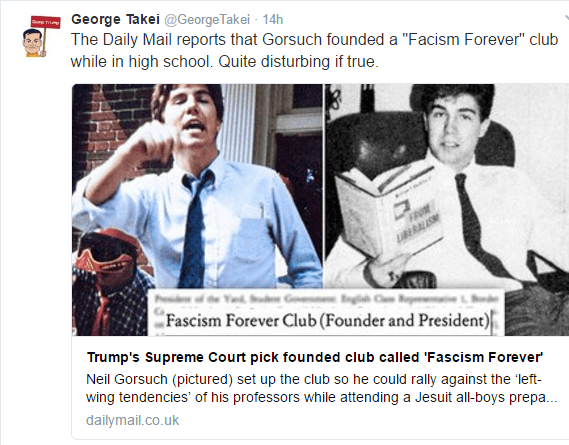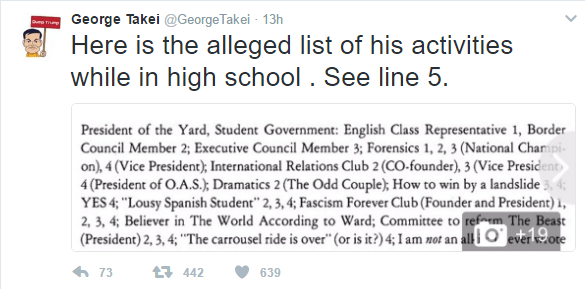Big Media Falsely Reports Gorsuch Founded a “Fascism Forever” Club in High School
Alana Goodman at the Daily Mail had a Big Scoop today: Donald Trump’s Supreme Court nominee founded a club in high school called “Fascism Forever!”
The only problem is, it’s not true.
Here are the introductory grafs from Goodman’s article:
Supreme Court Justice nominee Neil Gorsuch founded and led a student group called the ‘Fascism Forever Club’ at his elite high school, DailyMail.com can reveal.
The club was set up to rally against the ‘left-wing tendencies’ of his professors while attending a Jesuit all-boys preparatory high school near Washington D.C.
The name may be inconvenient for a Supreme Court nominee facing a tough confirmation battle. However it also shows the depth of Gorscuch’s right-wing credentials – and his penchant for mischief while attending his exclusive prep school in the 1980s.
Wow! That’s crazy! So . . . what’s her evidence for this?
A single entry in a high school yearbook.
He served as president until he graduated in 1985, according to his senior yearbook.
The yearbook described the ‘Fascism Forever Club’ as an anti-faculty student group that battled against the ‘liberal’ views of the school administration.
‘In political circles, our tireless President Gorsuch’s “Fascism Forever Club” happily jerked its knees against the increasingly “left-wing” tendencies of the faculty,’ said the yearbook.
Are there interviews with teachers to corroborate this? With former students? Photos of club meetings? Writings that set forth the club’s agenda?
Nope. That’s it. Just the yearbook entry. The End.

Above: the yearbook entry from the Daily Mail article
Ed Whelan wrote early today:
Earth to newpaper reporters: High-school yearbook editors sometimes have a sophomoric sense of humor. I am reliably informed that no such club ever existed and that there was instead an inside joke among friends in the senior class that parodied political debates happening at the school. A contemporary of Gorsuch’s at the school also tells me that yearbook editors added stuff to student blurbs without their permission. All of this also leads me to doubt the yearbook’s claim that Gorsuch was a “Believer in The World According to Ward.”
And at America Magazine, they have done the work Alana Goodman should have done, and tracked down a former teacher who has gone on the record to dispute the bogus story:
[Gorsuch] wrote that he founded and led the “Fascism Forever Club,” though those with knowledge of the school back in the 1980s say there was no such club. The mention of it in the yearbook was a tongue-in-cheek attempt to poke fun at liberal peers who teased him about his fierce conservatism.
It was “a total joke,” said Steve Ochs, a history teacher at Georgetown Prep who was the student government advisor during Mr. Gorsuch’s junior and senior years at the Bethesda, Md., school.
“There was no club at a Jesuit school about young fascists,” he told America. “The students would create fictitious clubs; they would have fictitious activities. They were all inside jokes on their senior pages.”
None of this kept the story from being reported all over Big Media. John Sexton notes stories at the New York Post, U.S. News and World Report, and the International Business Times.
And of course snarky lefties went nuts:
We all did crazy, embarrassing things when we were young.
But we didn't found a goddamn Fascism Forever club.https://t.co/m4jfuO6QlL
— Anthony Breznican (@Breznican) February 2, 2017
The story is garbage, and Alana Goodman and the editors at the Daily Mail should be ashamed of themselves.
[Cross-posted at RedState and The Jury Talks Back.]
UPDATE: Dana spent a while writing up her own post on this at the same time I did. I am appending hers as an update so you can see how we independently approached this. She also adds a lot of material you’ll find interesting. I did.
Quick! To The Fainting Couches: Neil Gorsuch Started A “Fascism Forever” Club At His Jesuit High School!!!
[guest post by Dana]
It is expected that anyone nominated to the Supreme Court by President Trump will be the subject of ongoing scrutiny, criticism, attacks, smears, and last but not least, fake news. But, c’mon, accusing him of having seriously started a club called Fascism Forever?? Oh, please.
Consider this obvious bit of ridiculousness from Salon:
Supreme Court nominee founded and led a student club called “Fascism Forever,” while attending a private prep school in suburban Washington in the 1980s.
The yearbook of Georgetown Prep described the club as an anti-faculty student group that battled against the “liberal” views of the school administration, according to the UK Daily Mail.
“In political circles, our tireless President Gorsuch’s ‘Fascism Forever Club’ happily jerked its knees against the increasingly ‘left-wing’ tendencies of the faculty,” said the yearbook. Gorsuch led the club all four years he attended the elite all-boys Jesuit school in Bethesda, Maryland.
Gorsuch’s willingness to flaunt anti-democratic ideas in service of his conservative politics continued through his four years at Columbia University in New York City where he founded a chapter of the Federal Society, the conservative law network. His senior photo was accompanied by a “joke” from Henry Kissinger: “The illegal we do immediately. The unconstitutional takes a little longer.”
With a seriousness that requires a furrowed brow to fully appreciate the immensity of this potential problem for Gorsuch and his nomination, Salon scolds with feigned concern:
While Gorsuch’s teenage politics could—and no doubt will—be portrayed as “youthful indiscretion” or irreverence in the face of “political correctness,” they will certainly raise problems for Gorsuch’s nomination. Confirmation hearings of Supreme Court justices often focus on the elusive question of “temperament,” especially among Republic moderates in the Senate who will decide Gorsuch’s fate.
Gorsuch will no doubt dismiss his youthful beliefs as the product of immaturity, not an unreasonable defense. (Democrats would defend a liberal nominee who had joined the Socialist Workers Party in high school or quoted a rapper with a criminal record in their yearbook photo.)
But Gorsuch now has the challenge of explaining away his immaturity while reaffirming his lifelong commitment to conservative politics, a tricky task especially in front of television cameras. His youthful antics open up a fertile field of inquiry for Democratic senators still bristling over the refusal of Senate Republicans to even consider Merrick Garland, President Obama’s nominee for the Supreme Court through the last ten months of Obama’s presidency.
And to make sure America understands just how very amusing serious this matter is and its negative implications for a nominee to the highest court in the land, Mark Potok, senior fellow at the Southern Poverty Law Center weighs in:
Apparently, the young Mr. Gorsuch felt that celebrating fascism was some sort of politically incorrect joke. Fascism is not a joke. There is nothing amusing about it. It has been responsible for the deaths of tens of millions of people, the destruction of much of Europe, and the attempted genocide of the Jews. The idea that a potential Supreme Court justice may still harbor such notions is chilling, indeed.
Chilling…!!
Salon was in equally good intellectual company with other media outlets that picked up on the story, as well as noted social and political pundit, George Takei, who has 2.11 million Twitter followers:
Thankfully, this ridiculousness was soundly debunked today by a teacher at Georgetown prep:
It was “a total joke,” said Steve Ochs, a history teacher at Georgetown Prep who was the student government advisor during Mr. Gorsuch’s junior and senior years at the Bethesda, Md., school.
“There was no club at a Jesuit school about young fascists,” he told America. “The students would create fictitious clubs; they would have fictitious activities. They were all inside jokes on their senior pages.”
…
As for concerns about Mr. Gorsuch’s purported early fascination with fascism, Dr. Ochs said the snippet in the yearbook—which he noted, for the record, he was not pleased that the yearbook editor let it be published—harkens back to a bygone era.
“There were some teachers who were ultra-liberal, and he would spar with them in class, like in religion class specifically, I remember, but always in good nature,” he recalled. “It sounds so strange today, when you can’t say boo without people going crazy, but it was all very good natured.
“There were some teachers who really didn’t like Reagan, and this is not appropriate, but they would challenge him and he’d come right back at them. He didn’t have any problem with that,” he continued. “He was an unassailably courteous kid, very popular with his class.”
This is what we are now conditioned to expect. Fake news from Big Media, it’s the new norm. Shame on the UK Daily Mail, Salon, SPLC and any other powerful entity that perpetuates and pushes these lies. And just think, it’s only going to get worse under President Trump.
When President Obama was in office, Big Media worked in a fast and furious fashion to make sure to provide him cover, and to shape stories to keep his carefully-tailored image in tact. Now, with a Republican in the White House, Big Media will be working overtime to make false allegations and accusations, no matter how ridiculous because they don’t want this administration to be seen as successful.
–Dana




